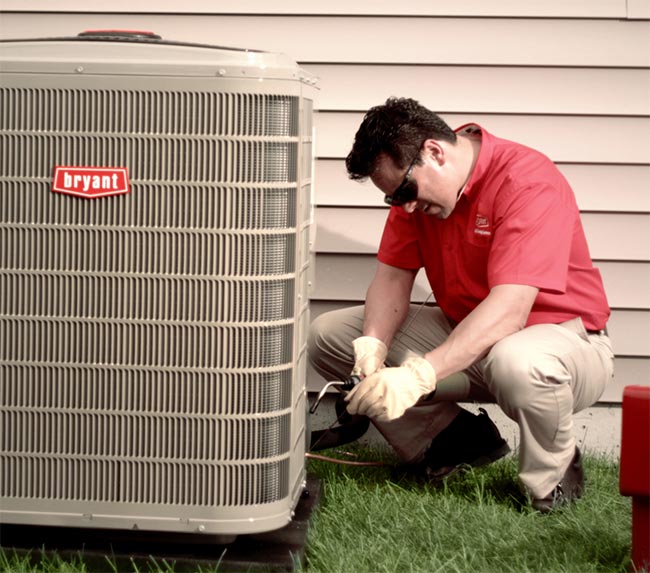Air Conditioners
An air conditioner is responsible for cooling a home...everybody knows that. However, very few homeowners actually know how cool is generated. The more you understand about your indoor comfort system, the more confident you'll feel about decisions regarding repair, maintenance and replacement.
Have you ever looked at your air conditioner? Notice there is no ducting attached to the unit? So where does the cool air come from? It happens like this...
Did you catch that note on heat energy? Heating and cooling is all about one thing: moving heat energy. But we're getting ahead of ourselves...keep reading.
The chilled refrigerant from the air conditioner is pumped inside to the indoor coil. The coil is either contained in a fan coil, or an evaporator coil and is a series of metal tubing.
The fan motor in the furnace (yes, your furnace is used year round) turns on and pulls air from the home via the return air duct(s). The warm air is forced through the chilled coil. As the refrigerant absorbs heat energy from the air, it decompresses back into a gas. The gas is sent back outside to the A/C, and the process repeats.
Have you ever looked at your air conditioner? Notice there is no ducting attached to the unit? So where does the cool air come from? It happens like this...
How Air Conditioning Works
The thermostat on your wall registers indoor air as too warm. It signals the air conditioner outside which begins compressing a gas called refrigerant. You'll hear HVAC contractors also call your air conditioner a compressor or condensor. This is because as the refrigerant is compressed, it condenses into a chilled liquid as heat energy is dissipated into the outside air.Did you catch that note on heat energy? Heating and cooling is all about one thing: moving heat energy. But we're getting ahead of ourselves...keep reading.
The chilled refrigerant from the air conditioner is pumped inside to the indoor coil. The coil is either contained in a fan coil, or an evaporator coil and is a series of metal tubing.
The fan motor in the furnace (yes, your furnace is used year round) turns on and pulls air from the home via the return air duct(s). The warm air is forced through the chilled coil. As the refrigerant absorbs heat energy from the air, it decompresses back into a gas. The gas is sent back outside to the A/C, and the process repeats.
Air Conditioning Efficiency
A Seasonal Energy Efficiency Ratio (SEER) rating is used to measure the efficiency of an air conditioner. However, be aware that the indoor coil and fan motor also play a part in overall cooling efficiency, as does the design and installation of your system. You must rely on a skilled air conditioning dealer to ensure that you have the right type of system for your home, and that it is installed correctly.
The image above is property of Bryant® Heating & Cooling
The Comfort Zone
Information about air conditioners
Information about air conditioners




